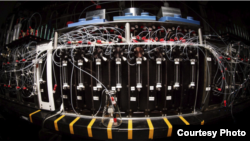Rapidly evolving three-dimensional printing technology has taken another revolutionary turn with the announcement by University of Illinois scientists that they have created the first "molecule-making machine."
The device breaks down complex molecules into their basic chemical ingredients and then reconnects them in a different way, releasing the byproducts of each chemical reaction.
Using more than 200 basic building blocks and thousands of different molecules, the machine can print billions of different organic compounds, including those never synthesized before.
Organic compounds of very low molecular weight help regulate biological processes in our bodies and make up most drugs, pesticides and even some electronic components such as light-emitting diodes and solar cells.
The new technology was designed by a team of scientists at the Howard Hughes Medical Institute, led by professor Martin Burke, and will be licensed by Revolution Medicines Inc.





